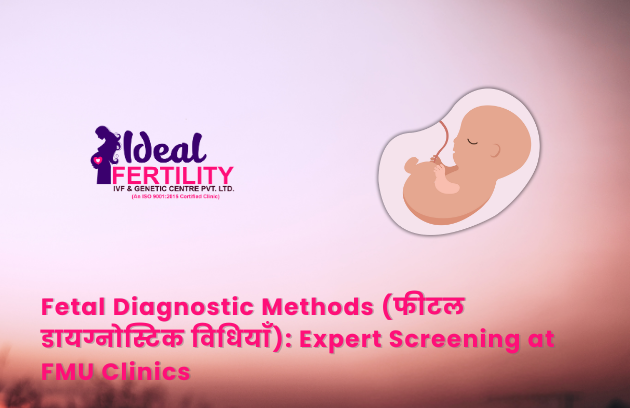Table of Contents
Early and accurate diagnosis of fetal abnormalities is a crucial part. Thanks to the specialized care provided by FMU clinics (एफएमयू क्लिनिक) and advanced tools used in fetal medicine units (फीटल मेडिसिन यूनिट), expecting parents can receive detailed insights into their unborn child’s genetic health.
From simple chromosomal checks to microarray analysis, the range of fetal diagnostic methods (फीटल डायग्नोस्टिक मेथड्स) has expanded rapidly. This article explains the most commonly used diagnostic procedures, when they are needed and how they work?
Chorionic Villus Biopsy (कोरियोनिक विल्लस बायोप्सी): Early Genetic Insight
When it's used?
- Typically done between 10-13 weeks of pregnancy.
- Recommended if previous screenings suggest risk.
- Often used in high-risk pregnancies or advanced maternal age.
How it works?
- A small sample of placental tissue is collected.
- The tissue shares the baby’s genetic makeup.
- The test detects chromosomal conditions and inherited disorders.
This test may be performed through the abdomen or cervix, depending on the fetus’s position. FMU clinics (एफएमयू क्लिनिक) offering advanced genetic services often use CVS when early results are critical for decision-making.
Amniocentesis (एम्नियोसेंटेसिस): Standard in Fetal Diagnosis
Amniocentesis is one of the most widely recognized fetal diagnostic methods (भ्रूण निदान की विधियाँ). It is typically performed between 15 to 20 weeks of pregnancy.
Why it's done?
- To detect chromosomal abnormalities like Down syndrome.
- To identify neural tube defects or rare metabolic conditions.
- To evaluate infections or fetal lung maturity (in later stages).
Procedure:
- A thin needle is inserted into the uterus to withdraw amniotic fluid.
- The fluid contains fetal cells and substances needed for analysis.
Karyotype Alone (केरियोटाइप): Basic Chromosomal Analysis
What it shows?
- Missing or extra chromosomes.
- Major structural rearrangements.
- Large deletions or duplications.
It’s useful for detecting common conditions like trisomies or Turner syndrome. However, karyotype alone (केरियोटाइप) may not detect subtle or micro-level genetic issues.
In FMU fertility clinics (एफएमयू फर्टिलिटी क्लिनिक), this test is often the starting point in complex genetic evaluations.

CMA Alone (क्रोमोसोमल माइक्रोएरे): Chromosomal Microarray Analysis
What it detects?
- Syndromes like DiGeorge or Prader-Willi.
- Subtle chromosomal anomalies that may impact development.
CMA alone (क्रोमोसोमल माइक्रोएरे) is ideal when a fetus shows abnormalities on ultrasound, but standard chromosome tests are normal.
Fetal medicine units use CMA for deeper analysis, especially when dealing with developmental or structural fetal concerns.
Karyotype and CMA: Comprehensive Genetic Screening
Benefits of combining:
- Karyotype identifies large chromosomal issues.
- CMA detects finer genetic changes.
- Together, they provide a complete genetic profile.
Karyotype Followed by CMA (यदि केरियोटाइप सामान्य हो): Stepwise Evaluation in FMU Clinics
This step-by-step method helps:
- Avoid unnecessary tests initially.
- Reduce cost burden.
- Still catch genetic issues missed by karyotype.
5-Probe FISH for Common Aneuploidy (फाइव-प्रोब फिश टेस्ट): Rapid Genetic Testing
What 5-probe FISH checks?
- Trisomy 21 (Down syndrome)
- Trisomy 18, 13
- Sex chromosome abnormalities (X, Y)
This test is often used when rapid results are needed- for example, when termination decisions are time-sensitive. Though not a full diagnosis, 5-probe FISH (फाइव-प्रोब फिश) can offer fast answers before karyotype or CMA results are available.
FMU fertility (एफएमयू फर्टिलिटी) require frequently and accurate fetal assessment. This is especially useful in emergency situations or late gestation diagnoses where time is critical for decision-making.
In well-equipped fetal medicine units (फीटल मेडिसिन यूनिट), the FISH test serves as a bridge- providing preliminary results while more comprehensive analyses like karyotyping or CMA are still pending.
How FMU Clinics Combine Fetal Diagnostic Methods for Accuracy?
The strength of a high-functioning FMU clinic (एफएमयू क्लिनिक) lies not in one test, but in how multiple diagnostic tools are used together to create a complete picture. Each test has its own role:
- CVS offers early results, often when time-sensitive decisions are needed.
- Amniocentesis provides definitive diagnosis in mid-pregnancy.
- Karyotyping helps catch major chromosomal abnormalities.
- CMA picks up micro-deletions and duplications not seen in a karyotype.
- FISH delivers rapid results to guide urgent care.
An FMU typically adopts a protocol-driven approach based on patient history, ultrasound findings and gestational age. These fetal diagnostic methods (फीटल डायग्नोस्टिक मेथड्स) are supported by advanced labs and genetic counselors who can guide parents through the interpretation of complex results.
Who Should Consider Fetal Diagnostic Testing?
While not all pregnancies require diagnostic testing, certain cases benefit from early and precise screening:
- Abnormal findings in prenatal screening tests.
- Family history of genetic disorders.
- Advanced maternal age (35 years or above).
- IVF pregnancies with added risk factors.
- Known carriers of inherited conditions.
- Multiple miscarriages or unexplained fetal loss.
In such cases, consulting a fetal diagnosis (भ्रूण निदान) expert can offer guidance on which test is most appropriate and when it should be done.
Conclusion: Choosing the Right Diagnostic Method Through Expert FMU Guidance
Fetal diagnostic methods (फीटल डायग्नोस्टिक मेथड्स) have evolved into a finely tuned system of layered genetic analysis. From CVS and amniocentesis to karyotype, CMA and FISH, each tool serves a different diagnostic goal- timing, clarity and safety.
Choosing the right combination depends on gestational age, ultrasound findings, family history and clinical judgment. That’s why partnering with an experienced fetal medicine unit (फीटल मेडिसिन यूनिट) is so important.
Their multidisciplinary approach, supported by trained specialists, lab technicians and genetic counselors, ensures the best outcomes for both mother and baby.
If you’re navigating a high-risk pregnancy or uncertain about prenatal genetic conditions, speaking with a specialist in FMU fertility (एफएमयू फर्टिलिटी) can give you clarity- and the confidence to move forward.

